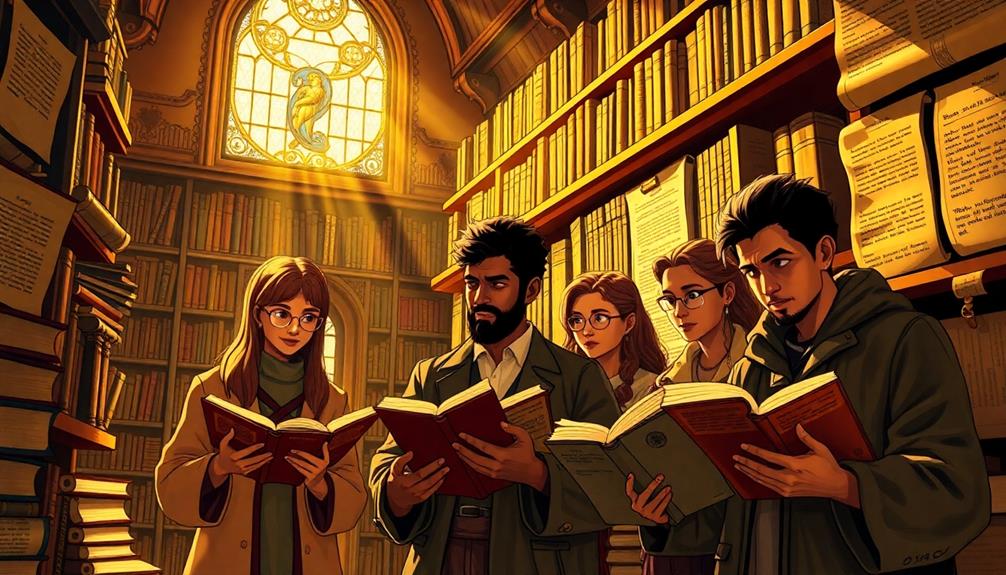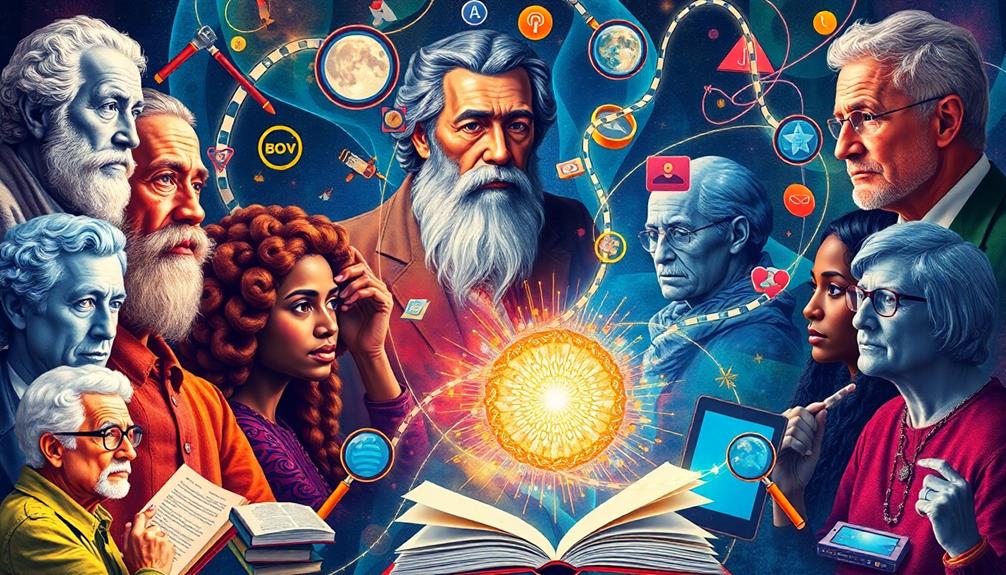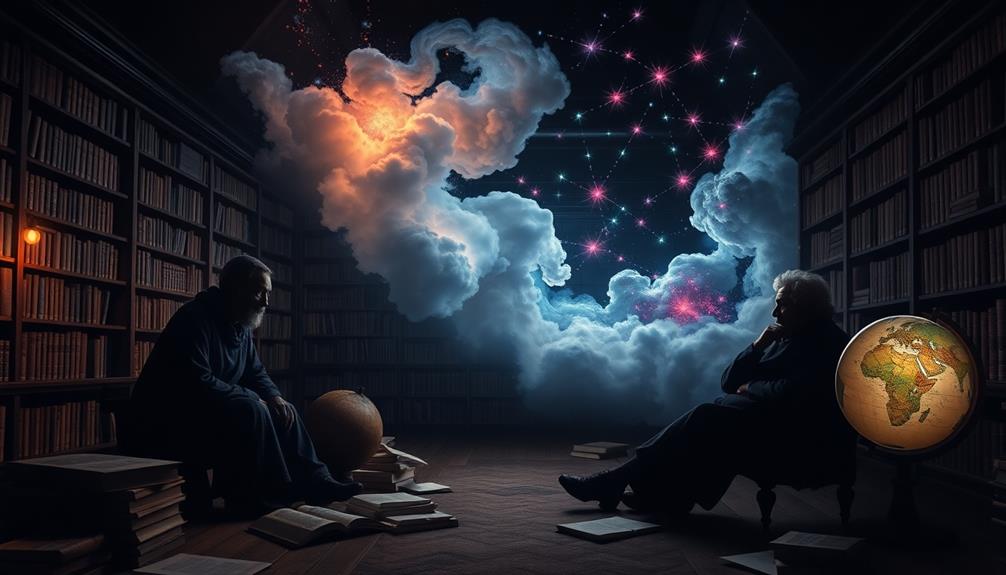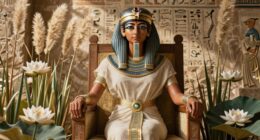Curiosity has driven human progress, and history's great thinkers offer powerful lessons on its significance. Figures like Socrates and Aristotle champion questioning and seeking knowledge, showing you that pushing boundaries leads to breakthroughs. Leonardo da Vinci's wide-ranging explorations highlight how diverse interests spark creativity, while Einstein's theories demonstrate the impact of inquisitive minds on understanding the universe. Today, curiosity fuels innovation, from science to technology, reminding us of its crucial role in personal and societal growth. Embracing this trait can inspire change in your life too, revealing even more insights waiting to be discovered.
Key Takeaways
- Socrates taught the importance of questioning assumptions, fostering critical thinking and deeper understanding of the world around us.
- Aristotle emphasized pursuing excellence (eudaimonia) as a path to personal fulfillment and societal contribution through curiosity.
- Leonardo da Vinci's interdisciplinary approach illustrates how curiosity can lead to groundbreaking innovations across various fields of study.
- Einstein's curiosity-driven research resulted in the theory of relativity, showcasing the transformative power of questioning established ideas.
- Marie Curie's dedication to inquiry and perseverance highlights the significance of curiosity in scientific advancements and discovery.
The Power of Curiosity

Curiosity is like a spark that ignites the flame of innovation and discovery. It's a powerful force that has driven human development for centuries. When you embrace curiosity, you open doors to exploration, allowing yourself to immerse yourself in diverse fields like science, language, and industry.
Influential figures throughout history, like Leonardo da Vinci and Albert Einstein, exemplify how curiosity can lead to groundbreaking innovations. Da Vinci's relentless inquiries into art, anatomy, and mechanics show how interconnected knowledge can be. Meanwhile, Einstein's famous assertion, "The important thing isn't to stop questioning," underscores the necessity of curiosity in understanding the universe.
In addition, cultivating a curious mindset can enhance your ability to visualize and manifest your goals, as seen in the principles of the Law of Attraction in sports. Nurturing your curiosity isn't just about seeking knowledge; it's linked to the pursuit of Arete (excellence) and Eudaimonia (happiness).
As you cultivate your curiosity, you not only enhance your understanding but also contribute to societal progress. By questioning the status quo and exploring new ideas, you can drive your own personal growth and inspire others.
Historical Perspectives on Curiosity

Examining historical perspectives on curiosity reveals a complex evolution in its perception. In ancient times, many cultures regarded curiosity as a deadly sin, viewing it as a vice that could lead to dangerous consequences.
However, over the last 200 years, this viewpoint has shifted considerably. Curiosity is now celebrated as a virtue, aligning with values of exploration and the pursuit of collective knowledge.
You might notice that curiosity has been a driving force behind societal and scientific progress. It has prompted advancements in various fields, including science, language, and industry.
Historical figures like Leonardo da Vinci and Albert Einstein exemplified how curiosity can transform understanding. They explored diverse disciplines, using their inquisitive nature to revolutionize the world around them.
Recognizing the importance of curiosity is essential for human development. It encourages you to question, explore, and expand your knowledge base.
As you reflect on the lessons from the Greatest Minds, remember that fostering curiosity not only benefits individual growth but also propels society forward, paving the way for future innovations and discoveries.
Lessons From Influential Thinkers

Wisdom often springs from the lessons imparted by influential thinkers throughout history. They challenge you to question assumptions, as Socrates did, laying the groundwork for critical thinking and dialogue. His teachings remind you that asking the right questions is essential to understanding the world around you and can lead to transformative life changes that enhance your personal growth.
Aristotle's concept of eudaimonia emphasizes pursuing excellence and virtue, guiding you toward a fulfilling life. This lesson encourages you to aim for personal growth and happiness through meaningful pursuits.
Leonardo da Vinci's insatiable curiosity led him to explore art and science, teaching you that interdisciplinary exploration can spark innovation. His groundbreaking contributions continue to inspire you to think creatively.
Albert Einstein revolutionized your understanding of time and space with his theory of relativity. His work illustrates how curiosity can drive profound advancements with real-world applications, urging you to embrace your inquisitive nature.
Lastly, Marie Curie's pioneering research in radioactivity highlights the importance of inquiry and perseverance. Her two Nobel Prizes serve as a reflection of the impact of dedication and resilience in advancing scientific knowledge.
Embrace these highly influential lessons, and let them guide your own journey of discovery.
Curiosity in Modern Context

The lessons from great thinkers show that curiosity isn't just a historical trait but an essential force shaping our modern world. Look at figures like Elon Musk; his groundbreaking work in electric vehicles and space exploration springs from a profound inquisitiveness.
Today, curiosity drives advancements in science and technology, reflecting its evolution from a once-dubious trait to a celebrated virtue. This transformative power of curiosity is evident in how it fosters innovative problem-solving skills and drives societal change.
Modern educational initiatives, such as "Big Ideas for Curious Minds," harness children's natural curiosity to foster philosophical inquiry and critical thinking. This approach guarantees that curiosity remains relevant in shaping future generations.
Research also links curiosity to increased cognitive development, promoting lifelong learning and adaptability in our fast-paced world.
You can see the legacy of great thinkers like Leonardo da Vinci and Albert Einstein still inspiring curiosity today. Their inquisitive minds led to groundbreaking discoveries that continue to influence contemporary thought and innovation.
Embracing curiosity not only fuels your personal growth but also contributes to societal progress, showcasing how crucial this trait is in steering and understanding the complexities of modern life.
Embracing Curiosity for Growth

Harnessing curiosity can be a powerful catalyst for personal and professional growth. When you embrace curiosity, you tap into a force that has driven humanity's greatest thinkers, from Einstein's revolutionary physics to da Vinci's artistic innovations. Curiosity isn't just a fleeting interest; it's a philosophy that encourages you to explore, ask questions, and seek deeper understanding.
Over the past 200 years, society has shifted its view of curiosity from a vice to a virtue. This evolution highlights how crucial curiosity is for innovation and progress. By engaging in philosophical inquiry, you foster critical thinking skills that not only benefit your personal development but also enhance your ability to contribute meaningfully to your field.
Take inspiration from icons like Frida Kahlo, who exemplified how curiosity can lead to groundbreaking contributions across various disciplines. Cultivating this trait is essential for lifelong learning.
The legacies of influential thinkers remind you that by nurturing your inquisitive nature, you can inspire others and drive societal change. So, don't hesitate to embrace your curiosity—it's your key to revealing growth and making a lasting impact.
Frequently Asked Questions
Who Is Famous for Being Curious?
When you think about famous people known for their curiosity, several names come to mind.
Leonardo da Vinci's relentless questioning led to groundbreaking art and inventions.
Albert Einstein transformed physics with his inquiries into time and space.
Richard Feynman's adventurous spirit exemplified the importance of exploration in science.
Frida Kahlo explored identity through her emotional artwork, while Elon Musk pushes boundaries in technology and space.
Their curiosity has inspired countless others to explore and innovate.
What Is the Big Ideas for Curious Minds About?
The big ideas for curious minds focus on cultivating philosophical thinking by introducing essential concepts and influential figures.
You'll explore vibrant themes that challenge your reasoning skills and spark your imagination.
This journey encourages you to ask questions, think critically, and connect ideas from the past to today's world.
With engaging stories and insights, it makes philosophy accessible, inspiring a lifelong interest in understanding complex thoughts and nurturing your intellectual curiosity.
What Is a Curious Mind in Psychology?
A curious mind is like a sponge, soaking up knowledge and experiences. In psychology, it's marked by an insatiable desire to explore and learn.
This drive not only enhances your cognitive skills but also sparks creativity and adaptability. When you engage your curiosity, dopamine floods your brain, rewarding your pursuit of understanding.
Ultimately, curiosity fuels intrinsic motivation, leading you to find joy in learning for its own sake, rather than for external rewards.
Conclusion
Embracing curiosity isn't just a personal journey; it can transform entire societies. Did you know that 85% of the world's most successful individuals attribute their achievements to a relentless curiosity? By learning from history's great thinkers, you can harness this powerful trait to foster creativity and innovation in your own life. So, immerse yourself in new ideas, ask questions, and never stop exploring. Your curiosity could lead you to insights that change your world—and perhaps even the world around you.









